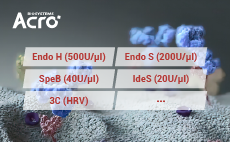1. Clear MOA
(1) The B7H3 protein (encoded from the CD276 gene) is a checkpoint molecule that is highly expressed in solid tumors, with reportedly limited expression in normal tissues. Overexpression of B7H3 is correlated with tumor progression, metastasis, and poor clinical outcome across a variety of malignancies.
(2) Monoclonal antibodies targeting B7H3 cause limited toxicity and have demonstrated some anti-tumor activity in clinical trials. Anti-B7H3 ADC can get better anti-tumor effect than anti-B7H3 mAb.
2. Antibodies specific binding to human B7H3 protein
Both anti-B7H3 are strong in binding to human B7H3. And anti-B7H3 #2’s affinity to mouse B7H3 is 100-fold weaker than Human B7H3.
3. High selectivity and affinity
(1) Both anti-B7H3’s cell-based affinity binding of 1-2 digit nano-molar was observed across cell lines. And No non-specific binding was observed on a target-negative cell line.
(2) No non-specific binding to other family members.
4. Induced strong B7H3 internalization on tumor cells.
5. Anti-B7H3 ADC showed strong potency in target-expressing cell lines, but weak potency in target-negative cell line, comparable to the isotype control ADC.
6. Good thermostability
1. Asset type: Anti-B7H3 ADC, 2 antibody sequences
2. Indication: Broad cancer
3. Modality: Small molecular
4. Research phase: Phase 1, IP has been granted in US, AU, CN
5. Cooperation demands: License-out or co-development
6. Research progress:
(1) Anti-B7H3 #2 (MMAE) ADC showed strong potency in target-expressing cell lines. Potency on a target-negative cell line was minimal and comparable to the isotype control ADC.
(2) Camptothecin ADCs: DAR8 conjugation was achieved. Both, Anti-B7H3 #1 and #2, showed some differential potency as Camptothecin ADCs over isotype control ADC in Calu-6 and HEC-251 cells.

Explore our catalog of therapeutic antibody solutions to find the right products for you! We are dedicated to delivering solutions designed to help you drive innovation and push the boundaries of what therapeutic antibodies can be.

Organoid Toolbox is a collection of organoid solutions including ready-to-use organoids, organoid differentiation kits, and a variety of services to accelerate the progress of your drug development project.

To enable antibody characterization methodsACROBiosystems has developed a series of enzymes.such as ldeS, SpeB, EndoH, and Endo S proteases, toassist with the characterization of antibodies and theirrelated post-translational modifications (PTMs)

ACROBiosystems developed a series of GMP grade cytokines under the GMP grade quality management system. Those products are all suitable for T/NK cell generation, activation, and proliferation in cell therapy research.

50+ targets designed for CAR detection, including PE/FITC/biotin labeled proteins. The key reagents for CD19 and BCMA were FDA DMF filed which can support your IND, NDA and BLA process.

GMP grade cytokines, reagents for cell activation, gene edition, DNA/RNA removal, etc. Particularly focus on product design, quality control and solution-based support to link each phase of your cell and gene therapy journey.

Full length multi-pass TPs with stabilized structure and high bioactivity for immunization, antibody screening, cell based assay and CAR detection, including hot CD20, Claudin 18.2, CD133, GPRC5D,CCR8, CCR5, etc.

A series of immune checkpoints including classic co-inhibitory and co-stimulatory receptors. The comprehensive catalog contains 100+ targets with various species and tags, and the high-quality proteins are in good batch-to-batch consistency.

To meet the needs of ADCs development, ACROBiosystems can provide: A variety of high-quality target proteins; MMPs/Cathepsin/uPA for cleavable linker; Anti-payload antibodies & anti-idiotypic antibodies for immunogenicity and PK analysis; SPR/BLI analytical and ADA development service.

Comprehensive collection of Fc receptor proteins, including their common variants, which can help expedite your antibody development.

Comprehensive cytokine targets including interleukins, growth factors, chemokines, TNFs, etc. are expressed by HEK293 to ensure their natural structure. Their high purity is verified by SDS-PAGE/HPLC/SEC-MALS and high bioactivity is verified by ELISA/SPR/BLI.

Aneuro provides innovative solutions for neuroscience research. Recombinant proteins, neural factors, pre-formed fibrils, electrophysiological electrodes, as well as Organoid Toolbox all in Aneuro aiming to advance neuroscience research, develop therapeutic interventions, and improve diagnostic methods for neurological diseases.
This web search service is supported by Google Inc.
